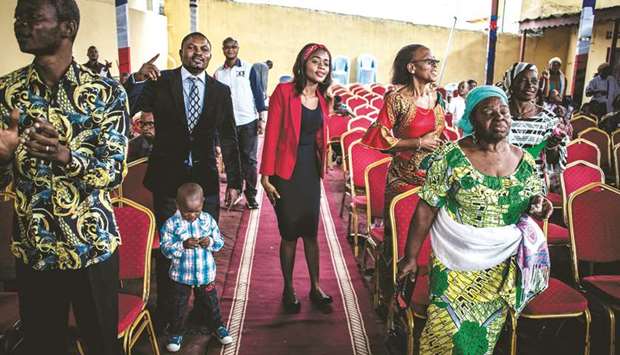Presidential, legislative and provincial elections had been scheduled for Sunday in the vast, volatile African country, defusing a two-year crisis over the future of President Joseph Kabila.
But on Thursday the Independent National Election Commission (CENI) ordered the postponement, saying a warehouse fire had destroyed voting materials.
“The members of the Security Council expressed their hope that this delay will permit the creation of favourable conditions for the Congolese people to express themselves freely” on December 30, the 15-member Council said in a statement.
It also “called on all parties to engage peacefully and constructively in the electoral process,” to ensure “a transfer of power in accordance with the Congolese Constitution and the 31 December 2016 Agreement.”
Kabila, 47, was due to step down at the end of 2016 after reaching the end of his constitutionally-limited two terms in office. But he stayed on, invoking a caretaker clause in the constitution.
Elections were postponed until the end of 2017 under a deal brokered by the powerful Catholic church - and then again until 2018, when Kabila eventually confirmed he would not run again.
The delay sparked protests that were bloodily suppressed and sparked an outcry from Western nations and the UN.
In its statement, the Security Council reiterated the readiness of MONUSCO, the UN peacekeeping mission in DR Congo, “to provide support if requested.”
Kinshasa has several times said it wants to organise the elections without financial aid or logistical support from the European Union or the UN.
Africa’s second largest country is rich in raw materials and minerals but cursed by deadly violence, insurgencies, graft and poverty.
Here are some facts about the country.
l Vast country
Eighty times the size of its former colonial master Belgium, the DRC covers 2.3mn sq km in the middle of Africa, behind only Algeria in area on the continent.
The majority of its population of 81.3mn people (World Bank, 2017) is Catholic.
As well as having access to the Atlantic Ocean it shares its borders with nine other countries: Angola, Burundi, Central African Republic, Congo-Brazzaville, Rwanda, South Sudan, Tanzania, Uganda and Zambia.
It is a nation plagued by conflict and disunity.
While the official language is French, it has four indigenous national and 200 vernacular languages, hampering the forging of a national identity since independence in 1960.
l Regional war
The first democratically elected prime minister, independence hero Patrice Lumumba, was assassinated in 1961.
Army strongman Mobutu Sese Seko grabbed power in a coup in 1965, imposed the name Zaire and set up a dictatorial kleptocracy that lasted 32 years.
Rebel Laurent-Desire Kabila launched an armed campaign to overthrow Mobutu that drew in neighbouring countries.
He seized power in 1997, renaming the country after the mighty Congo river.
Kabila expelled the forces of his Rwandan and Ugandan allies, sparking a conflict in the Kivu border region in which several African countries became involved.
The 1998-2003 conflict caused millions of deaths from violence, disease and starvation, called by some Africa’s “Great War”.
Many militia groups remain active in Kivu - divided into North and South provinces - which continues to suffer massacres, widespread rape and other atrocities.
Central Kasai province is another violence hotspot, with around 3,000 people killed in less than a year of unrest that erupted after soldiers killed a tribal chief in 2016.
l Disease and rape
Aid agencies have accused all sides in DRC conflicts of using rape as a weapon of war to terrorise local populations.
South Kivu-based gynaecologist Denis Mukwege won the 2018 Nobel Peace Prize for his work with women who have been victims of sexual abuse.
The country also suffers from Ebola, the haemorrhagic fever named after a river in the north of the country, and cholera.
Its tenth outbreak of Ebola since 1976 was declared on August 1 and has claimed at least 285 lives, according to a health ministry update in early December.
A cholera epidemic has claimed 857 lives since the start of the year, the World Health Organisation (WHO) said last month.
Last year, the country had 55,000 cases of cholera, resulting in 1,190 fatalities.
l Cobalt, copper, coltan
The DRC has the potential to be one of Africa’s wealthiest countries “if it can overcome its political instability,” the World Bank says.
It is the world’s leading producer of cobalt, a key ingredient in top-range batteries including for smartphones and electric cars, and a top supplier of coltan, another mineral used for electronic products.
It is also Africa’s top producer of copper and sits on hydrocarbons, tropical timber, gold, diamonds and other minerals.
But competition for the wealth has bred conflict, graft, smuggling and mismanagement.
It is ranked 176 out of 188 for its human development (UN Human Development Programme) and 161 out of 180 for corruption (Transparency International).
In 2017 its economy grew 3.7%, according to the World Bank.

